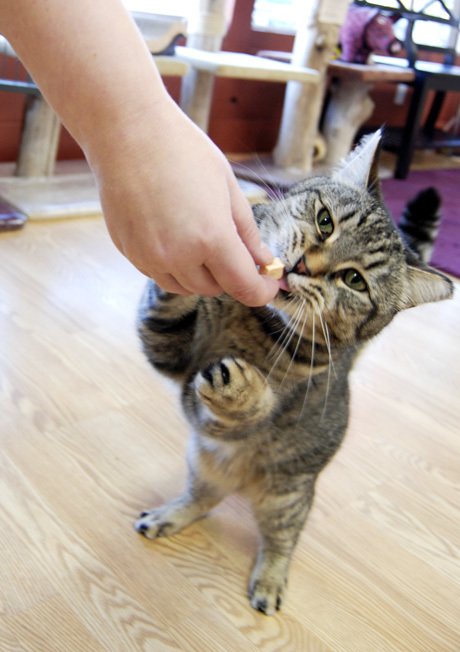Few residents may realize that they share this Island with colonies of feral cats. Whether lounging around the Town Center, wandering neighborhood streets or making their home in one of the Island’s many parks, these groups of wild cats are out there. Some are spayed and neutered. Others are not. But all of them, according to animal activist Nancy Howard, deserve a protected life.
“Unfortunately, the strategy has been more of trap and kill than trap, neuter and return,” said Howard, who manages All the Best Pet Care on Mercer Island.
Howard has rescued hundreds of street cats in her life, she said. Today, it is her avocation and passion.
On top of her responsibilities as general manager for All the Best Pet Care’s eight stores, Howard devotes hours to her self-founded cat rescue program, Feral Care.
Started in 2001 with a friend, Howard has nurtured Feral Care into a Seattle-wide organization with heart. Today, the 501c3 nonprofit is run entirely by volunteers. Their primary goal is to “end the cycle of homeless cats through humane population control.”
The group currently cares for 60 rescued cats at a sanctuary in Bothell. Others are placed into Feral Care’s foster program. The majority of cats up for adoption live at the All the Best Pet Care stores — including two cats at the Mercer Island shop — until they find families.
With the imminent disintegration of King County Animal Control, which will begin when the county closes its animal shelters this January, Howard’s program has never been more important. Yet helping the area’s feral cats is a choice that any citizen can make, according to the activist.
“The legal limit in King County is three cats per household. So there’s this wonderful legal opportunity; if every house adopted one more kitten, it would make a massive difference,” said Howard.
That does not, however, mean that everybody wants to.
There are many people — residents of Mercer Island included — who either are disgusted by street cats or turn a blind eye to them. And for legitimate reason.
Many of the cats are dirty. Others can be a suburban nuisance, especially if they are not spayed or neutered and therefore multiply in population. Sometimes, the cats can be aggressive, and can stir up trouble with domestic pets or attack bird populations.
Just last week, the Reporter received a letter to the editor from an Island citizen complaining about feral cats living at the Recycle Center.
“Feral cats are unhealthy and are a risk to persons and other animals. Feral cats carry disease. They are also a threat to wildlife and have been known to decimate entire bird populations,” wrote Islander Virginia Arnon.
Yet Howard disagrees. For the most part, she said, feral cats are harmless and independent. If a cat does carry disease, it is rarely transmittable to other species, the animal activist added. A recent study published by the American Veterinary Medical Association backs this statement.
In Howard’s opinion, the homeless cats actually do some good, by keeping rats and raccoons away from domestic neighborhoods.
“Feral cats are great natural rodent control. If you eradicate the cats, something else will move in; either raccoons or rats,” Howard said. “So a well-managed colony — that is a minimum of 80 percent neutered — will represent pretty stable rodent control.”
But in order to have “a well-managed colony,” the cats must be spayed and neutered. And this is where Feral Care’s “trap, neuter and return” formula comes in.
Annually, the organization traps, neuters and returns more than 1,000 feral cats. On Mercer Island alone, Howard said she has neutered and returned more than 60 cats in the past few years.
Those cats that, for various reasons, cannot be returned to the place from which they were taken are brought to Feral Care’s Kent sanctuary. Many will live there permanently. Others, usually kittens, are placed in the organization’s foster care program, waiting for adoption. Howard always hopes for the latter.
“We offer a great opportunity to bring a kitten into the household,” she said, adding that, with the current situation in King County, there has never been a better time to adopt. “It’s this great win, win, win opportunity for cats, shelters and families.”
For more information or to adopt a cat, visit www.feralcare.org.



